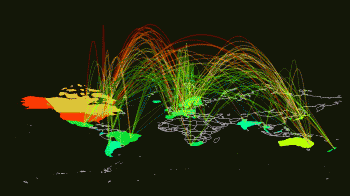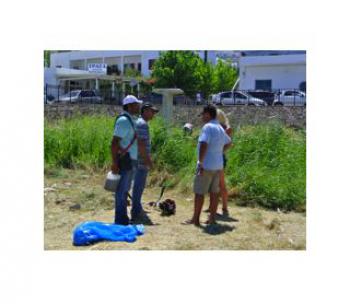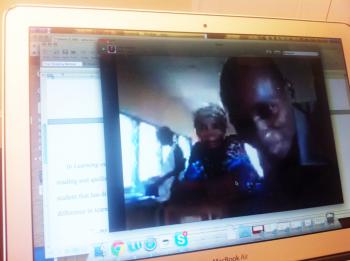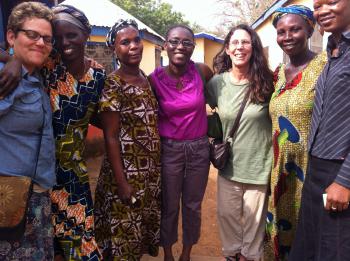Serendip is an independent site partnering with faculty at multiple colleges and universities around the world. Happy exploring!
Mapping What's Not On the 'Net
Mapping What’s Not On the 'Net:
Complexifying the Classroom in the Age of Globalization
Anne Dalke, Alice Lesnick and Susan Sutton, Bryn Mawr College
Our Google Doc Internet Traffic Map (from Map of Science)
Internet Traffic Map (from Map of Science)
5th COIL Conference on
Collaborative On-Line International Learning
3:15-4:15, April 3, 2013
Global Classroom (A), SUNY Global Center
Our Google Doc
"The vitality of our teaching derives not from the recitation of what is
certain but from the explorations of questions that are still unsettled and raw"
(Gerry Canavan, Some Preliminary Theses on MOOCS).
and feel free to begin editing-or-commenting,
as thoughts arise.
I. Anne invites participants into a conversation,
beginning with a video:
Wife # 2 (1:46-7:10)
Please go now to our Google Doc,
and write your responses to what you have seen and heard:
What questions do you have for our teachers here?
What would you like to say to them?
What would you like to understand better,
about their life and work?
(For example: what are they organizing for?)
What kinds of things do you need to know,
in order to understand what they are saying-and-doing?
What might you tell them, about your own life?
What stories might you have (about access, language
acquisition, freedom, gendered roles, schooling,
hopes for yourself or your children...?) to lay alongside theirs?
This documentary video represents a familiar instructional technology,
so well known as to be naturalized…
Now, we listen to other voices,
speaking to us in other modalities
(via text, phone, email, Skype, image, and help from a friend: thanks, Safianu!)
|
What are your hopes and dreams for girls, women and education in the North?
|
Beginning with these images and voices, we ask what happens when
we try to learn from teachers living in a North Ghanian village,
not through a stabilized academic curriculum,
but in a different way...
What could we do to further enable
access between-and-among us?
How can we structure a situation in which
teaching goes in both/multiple directions?
How might we more acutely and imaginatively hear what others are saying?
How can we avoid seeing others through a dominance narrative,
through preexisting stories that tend to erase them?
How might we also acknowledge the limits of our hearing, of our understanding?
How can we structure scenes of dialogue and pedagogies that respect
unknowability and yet also move everyone's learning forward?
How can technology help us with this?
What new structures and on-line unmediated spaces might contribute
to the sort of dialogue that recognizes fundamental differences/alterity...?
How do you connect your responses to these various images, words and sounds
to your larger understandings about how global learning takes place?
You are welcome to continue writing your answers to these questions--
and of course to keep asking further questions!--on
our Google Doc, but let's also take a few comments here, now,
while we keep that back channel open...
II. Alice gives Ghanian (and Danish) context in relation to "complexifying the classroom:"
these media showcase women teaching and learning,
what do they usually mobilize for?
showcase women's awareness of the
the way forward.
Changing character of education:
openings into child-centered, interactive approaches.
III. Susan elaborates on the anthropological and institutional dimensions of this dialogue
What falls away in the rush to categorize?
 |
 |
Which is the better model of culture?
 |
 |
What makes for a good conversation?
 |
IV. Anne pulls down some of what’s just gone up here:
what does it mean to map what's not there?
We used this on-line space as a real place to engage the unknown,
to access y/our thoughts/words/questions, which are/might be
controversial/conflictual/multi-literate, otherwise unspoken.
We have taken some risks in doing this:
* marking/marring our presentation by some of the
very gaps/partialities/appropriations we caution against
(for example: representing our partners in a format that is
not really accessible to synchronous dialogue...); and
* not knowing where this conversation would go.
Developing an on-line identity is always a risk:
we are always going places/getting involved where we didn’t mean to...
So: how can we co-create this process of learning from one another
in ways that are respectiful both of our own precarity (complexity, unknowability, and yes, privacy)
and that of our partners....?
We have tried to do this reponsibly (in part,
by acknowledging the limits of what we are doing);
if we are not responsible in our risk-taking,
we are just teaching that it’s intolerable...
Keeping our google doc open as we went on
models incompleteness: we can’t ever catch up with
what we are saying/thinking/learning....
Some of our conversation is now on our Google Doc,
accessible through our "digital ecosytem," Serendip Studio:
How might you take this into further on-line discourse?
Is there anything here you would tweet/add to a listserv?
What other spaces do you use for dialoguing...?
How do your responses to these
various images, words and sounds
connect to your larger understandings
about how global learning takes place?
| Attachment | Size |
|---|---|
| CYA-12StepProgram.doc | 28 KB |
| CYA-TopTenForCulture.doc | 29.5 KB |
| Dalun Overview (Yussif Abdul-Hafiz & Alhassan Sumaila, 2013).doc | 64.5 KB |





Comments
Post new comment